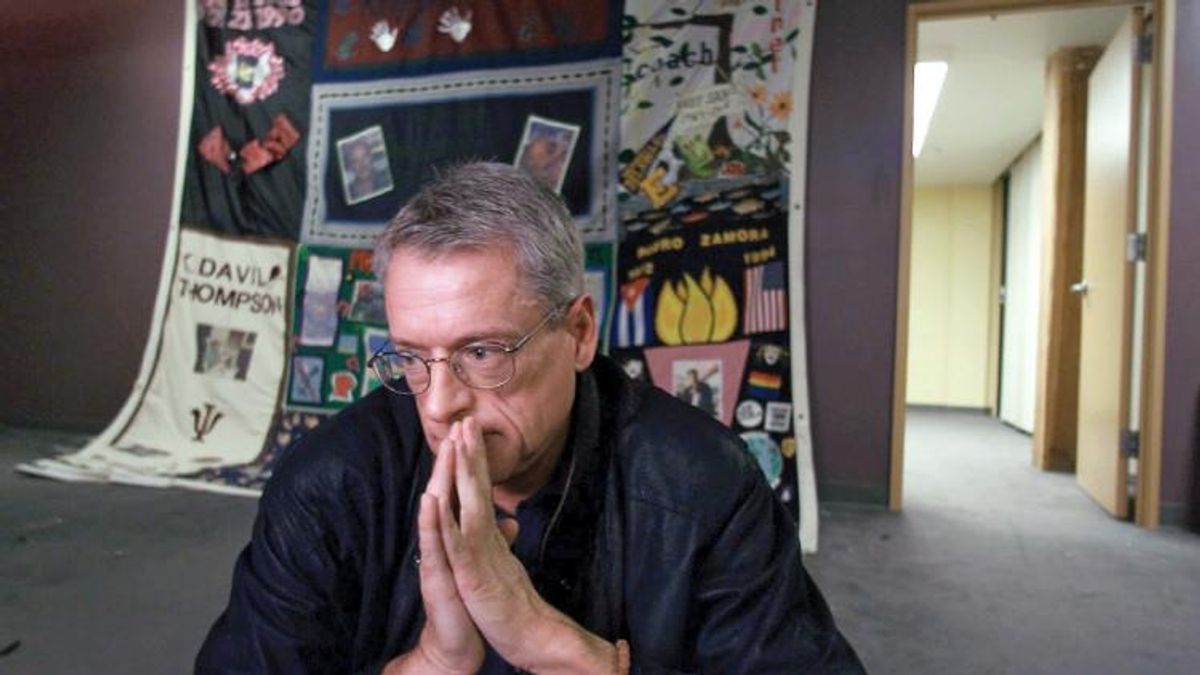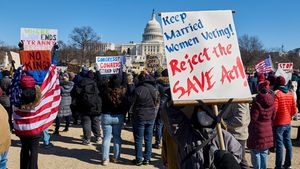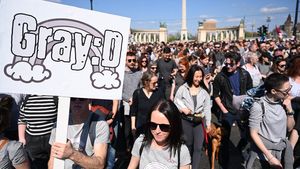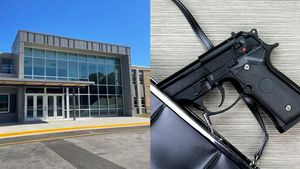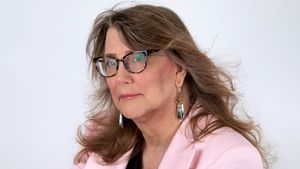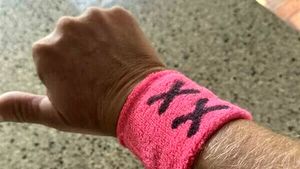The broad strokes of Cleve Jones' five decades in the fight for LGBGTQ+ rights include the Gay Liberation movement in the 1970s, being mentored by Harvey Milk, conceiving of the AIDS Memorial Quilt, co-founding the San Francisco AIDS Foundation, and working on behalf of marriage equality.
Zooming out, the fuller picture of his life is one marked by profound loss: he was at City Hall the night Harvey Milk died, where the sight of Milk's body and the gunshot wound changed Jones forever; he lost an uncountable number of friends to AIDS; one boyfriend killed himself. The lesson from Cleve's life and memoir, When We Rise, which was part of the inspiration for the ABC mini-series of the same name, is one of queer resilience; though we still live in a world that doesn't grant LGBTQ+ people full rights and protections under the law, when we come together and when we refuse to back down, change is possible. That change begins with coming out, a crucial part of the movement that Jones says is often lost in younger generations.
Jones talks about the power we gain from coming out, the disappearing queer community in San Francisco, and why he wants people to know that Harvey Milk was "neither a genius nor a saint".
Why was it important for you to come out when you were 17? It was the early 70s and you could have easily not told your parents and still moved to San Francisco as you did.
A big part of the movement then was this whole issue of coming out. I'm frustrated when I hear young people tell me that they don't feel the need to label themselves or come out, and I get part of it: You don't want to be labeled. You don't want to be restricted or confined in any way. I get that part of it, but it still sounds like the closet to me.
The reason that it's so important is because once the haters know that they have queer and trans people in their families, in their workplace, in their neighborhood, on their block, in their congregation, in their school, once they know they know us, it becomes very difficult for them to continue to hate us, and more difficult for them to vote against us or harm us. Coming out has always been an essential part of this movement. That was something that was articulated very powerfully by Harvey Milk during his campaigns in San Francisco.
And even that young, you knew how important it was?
I joined the Gay Liberation front and that was the rally and cry: we have to come out. We have to come out. It seems so simplistic in some ways, but it's really a very powerful notion. It's a big part of why we have come as far as we have within my lifetime. It's because ordinary people, not famous people, not Hollywood people, not political people, but ordinary queers made that bold decision to say, "Mom, Dad, this is who I am," to reveal their true identity not only to family, but to clergy, to employers, to the military. Yeah, it was real bravery.
After coming out, you moved to San Francisco which is known for its strong community. Where is that queer community now that San Francisco's changed so much?
Well that's a very good question. It's something that I think about a lot right now, because the reality is that the gayborhoods are going away. It's not just a place where there's bars, although bar life has always been an important part of our culture. It's where very important things happen. It's also about political power. When we are concentrated in specific precincts, that gives us the power to elect our own to public office, the power to defeat our opponents, the power to pass legislation that directly affects our lives and our wellbeing. As we are dispersed, we lose that power.
Another super important part of it was the cultural vitality. Look at all the amazing stuff that's come out of West Hollywood, that's come out of my neighborhood. It's no coincidence that the rainbow flag and the first gay synagogue and the first gay film festival and the AIDS memorial quilt and the Sisters of Perpetual Indulgence all were born in the Castro, because there's that magic that happens when creative people, when choreographers and filmmakers and dancers and DJs and painters are all in the same area. I know that collaboration can occur very effectively online, but there's nothing like the magic of face-to-face eye contact, close proximity, that cultural vitality.
Then the third thing that's at risk are the specialized social services for our most vulnerable population. Whether we're talking about people like myself who are getting old, or long-term survivors of HIV, or queer and trans kids who are fleeing Trump's America. Where do they go? They can't come to the Castro. A little crappy studio apartment in the Castro's going to cost you $2500 a month.
This is the reality that nobody's really quite talking about is that that community that has given us so much and strengthened us and inspired us and moved us forward is really being threatened. It's many factors. Many people will say, "Oh, well we can live anywhere we want." No, you can't. Ha! Don't tell me that. Try it. Go to Duluth and walk down Main Street and hold hands. No offense to Duluth or any other city. Try doing that outside of the gayborhood. We need these spaces. They're important and we need to figure out what's our next move.
The community has always been good at problem-solving. You were a part of the Butterfly Brigade in San Francisco that was formed to protect your neighborhood.
You know, that's a good point. We had to create everything from scratch. When the fag bashers came into the Castro from the suburbs to beat us up, the police didn't protect us. The police were all Irish and Italian Catholics, no offense to either demographic, but they were pretty freaking homophobic and just as likely to beat you up as the bashers. We had to defend ourselves. We had to create street patrols and buy walkie-talkies and learn self-defense and get pepper spray and beat the crap out of anybody that came in our neighborhood and caused trouble because the police wouldn't deal with it.
When AIDS came, we had a president at the time who has since been elevated to sainthood in some quarters. His name was Reagan. He didn't say the word AIDS publicly until more Americans had died of it than died in the entire Vietnam War. We were on our own. People were starving to death because they were too weak to get food, so we fed them. People were being thrown out by landlords who were terrified of the purple spots on their faces. We housed them. People were abandoned by their families and left alone by their clergymen, so we comforted them. That's what we had to do. We had no choice.
You conceived of the AIDS Memorial Quilt, but I don't think many know that Rosa Parks made panels for it.
Yes, I got to meet Mrs. Parks in Detroit. I got to go to church with her, and then I was invited to speak to the congregation. She made quilt panels for a family where three generations of women in that family lost their lives to AIDS. The grandmother had had a hip replacement surgery and had a transfusion before the blood supply had been secured. Then her daughter had had some issues with drugs and contracted it and passed it onto her infant girl before she realized that she was HIV positive. It was a really very tragic example of how horrible that disease was.
Mrs. Parks, to have her support and just the amazing privilege of being in a room with her, being in a car with her, sitting at a table with her and sharing a meal was something I'll never forget.
How early into the epidemic did people start to realize that HIV was most often sexually transmitted?
At the beginning, it was very mysterious and terribly frightening. By 1985 it was pretty well established. There's still a lot of myths and stupid things out there, but I think I knew what was happening before it was proven just because I was working with a guy named Dr. Martha Conant, who was one of the real heroes of the pandemic. In 1981, just after the first reports, he saw some of the first patients in San Francisco. One night at dinner at the Zuni Cafe, he said, "I think it's a new virus. I think it's sexually transmitted. I think it can remain dormant in the body for a long time, and that it's fatal." The way he delivered that news to me, I remember looking up and saying, "Then we're all dead."
It's a horrible combination.
I think this is another thing that might be harder for younger people today to understand now that there's so many representations of lesbians and gay men and bisexual people and now even transgender people. Back then, our sexuality had been so repressed, so attacked, and it was a sexual liberation movement then. That was the phrase that we used. This was sexual liberation. It was about tearing off the Puritan shackles of America and exploring our sexuality in a way that was very joyous and hot and exciting.
I think in some ways it was maybe even more important than it is now, because it had been so repressed and so hidden and condemned. To suddenly say to all of these people who had been exploring and celebrating, this is death, you know, it was really difficult for people to comprehend.
How aware were you of what was going on in other cities, like the work of the Gay Men's Health Crisis and Larry Kramer in New York?
Well, when Larry published his first article about it, I was very excited because I knew that Larry could reach the guys on Fire Island. Gay culture in New York was completely different from the gay scene in San Francisco.
Back then each city's gay community, which is the term we used then, was very distinct. Some boys went to LA, they wore gold chains and bleached their hair and went to auditions. Some boys went to New York and did real theater or worked for law firms. In San Francisco, we were poets and wore button fly jeans and stapled our posters to the telephone poles.
We were all very connected and AIDS required us to collaborate in a new way. We didn't pull off our first march, our first national march, until 1979 after Harvey [Milk] died. People had been talking about doing a march on Washington for years and years and years and years, but nobody could get the queens in each city to agree. Everybody had their little fiefdoms. Harvey's death really created the space for that first march to happen. AIDS created something else.
There's a martyrdom to Harvey Milk today. He's remembered as a hero. Was he viewed that way while he was living?
Harvey was a complicated guy. What I want everybody to know about him, especially younger people, was that he was in many respects an ordinary man. In my view he was neither a genius nor a saint. His personal life was often a mess. He was a terrible businessman, usually broke. He was very kind. He was very funny. He could be a total bitch. He was the first adult to tell me that I had value as I was. He mentored me, was there whenever I got my heart broken.
He genuinely loved people and his city and was courageous, but his achievements are ones that I think we can all aspire to. Had he lived, I believe he would have become our mayor. Would he have survived the pandemic? Who knows.
Certainly, with his death, he gave us our first real collective martyr. We'd had thousands of martyrs, people who had been murdered and beaten to death, people who had taken their own lives, who drank their lives away or overdosed. We've had a lot of martyrs, but Harvey became that unifying symbol. Even that was being forgotten until Gus Van Sant and Dustin Lance Black made the film.
Are you saying he became this saint figure because we needed a saint?
Yeah. You hear people say, "No, he's our Dr. King." Harvey would have just, I think, been baffled by that. I mean, he was a little shopkeeper on Castro Street who had a failing camera store. He had a temper and his personal life was tempestuous.
One of many terrible things about AIDS was that it disrupted the transmission of information from one generation to the next, because half of my generation got wiped out and those of us who survived, many of us don't want to talk about any of it because it's too painful, still. His memory was beginning to recede. We had a core group of what began as many people and dwindled over the years to a very handful who were doing whatever we could to keep his name alive.
I would go and speak at universities with tons of LGBT people in the audience, and I'd say, "How many of you know who Harvey Milk was?" Maybe one or two hands would go up. Gus and Lance changed that with Milk and Sean Penn's portrayal. It unearthed his story in a way that was really important and powerful. I'm really grateful that it happened.
With so many friends and loved ones dying, how did you deal with it all? How did you figure out how to go on?
Well, it did destroy me, I think, in many ways. I'm still depressed, but you just keep going. For me, my sweet Ricardo committed suicide. I think I already knew in my heart that I would never do that because of the pain it would cause people who loved me. There were so many times I wanted to. So many times. So many times I'd thought it through, how to do it.
When Ricardo did it, it was so devastating to me that I knew then I will never do that. I don't know how I survive. I think it was a big help by the time I got sick that my parents and my family were supporting me. Having that emotional support's good.
Also, I'm an educated white man with a job and insurance. I was famous by that point, so I had access to the best medical advice. I understand how I managed to survive that part. I think most of the guys I know my age have post-traumatic stress disorder. I'm in a new relationship with somebody who's a lot younger than me. I feel like this last year, despite the election, I'm experiencing joy again.
I'm really ridiculously in love. I tell my boyfriend and he just rolls his eyes, but I think I'm happier now than I have been at any time since AIDS came and killed all my friends. I am so grateful to be alive.
This interview was conducted as part of LGBTQ&A, a weekly podcast hosted by Jeffrey Masters that documents modern queer and trans history. New episodes of LGBTQ&A come out every Tuesday.
RELATED | Civil Rights Icon Bayard Rustin Pardoned For Anti-Gay Charges
